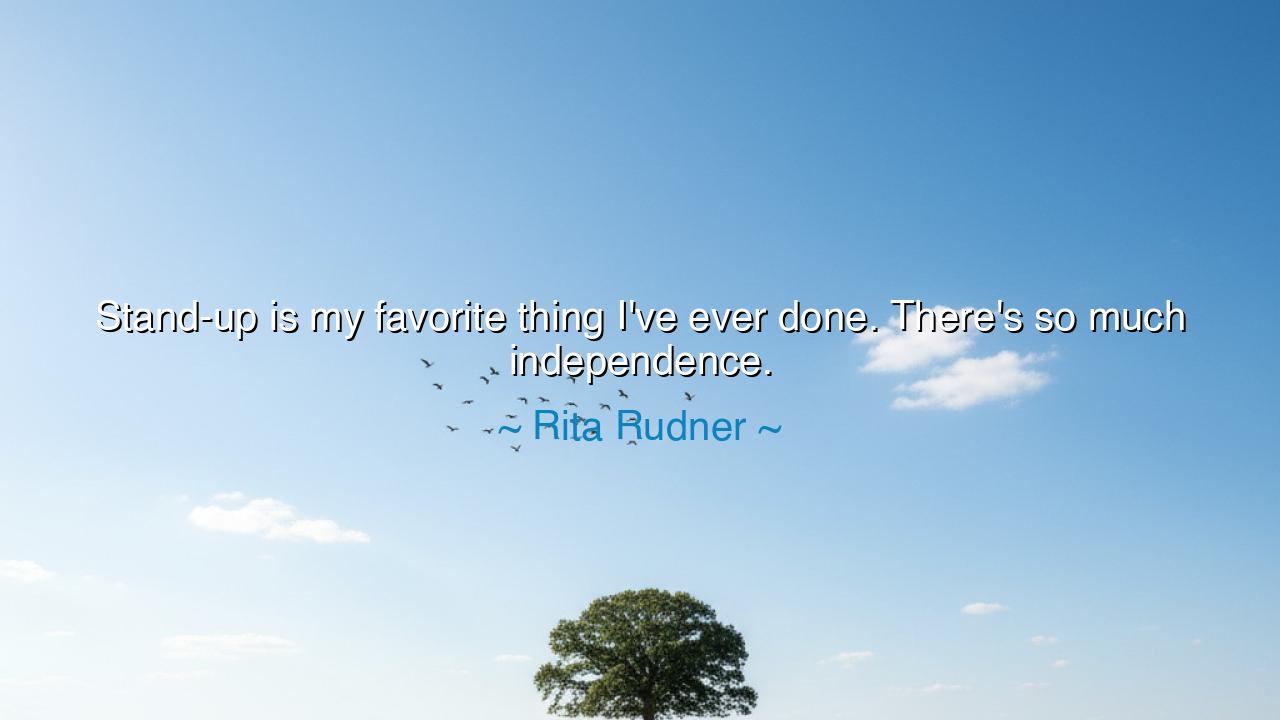
Stand-up is my favorite thing I've ever done. There's so much






“Stand-up is my favorite thing I've ever done. There's so much independence.” Thus spoke Rita Rudner, a woman whose grace and wit transformed silence into laughter and solitude into art. Her words, simple in form yet rich in meaning, reveal the heart of a creator who has walked alone upon the stage and faced the vast unknown of human response. In them lies not only the story of a comedian but the eternal song of the independent spirit — the soul that finds its power not in the company of many, but in the courage to stand alone.
The origin of this quote rests in Rudner’s long and luminous journey from dancer to comedian. She began her career in the world of ballet and Broadway, where every movement was choreographed, every cue measured, and every performance bound by the structure of ensemble. Yet within her stirred a restless voice — one that sought expression unshaped by others’ direction. When she turned to stand-up comedy, she entered a realm of pure autonomy: no script, no partners, no orchestra to follow — only the light, the microphone, and her mind. There, in that fragile solitude, she discovered what she calls “independence” — the freedom to craft her own truth, to create laughter not from imitation but from understanding.
The meaning of Rudner’s words extends beyond the stage. For in every human life there comes a moment when one must step alone before the world — without shield, without chorus — and speak in one’s own voice. The stand-up comedian, in this sense, becomes a symbol of courage: standing before an audience that can either exalt or reject, finding strength not in approval but in authenticity. Each joke, each pause, each breath is a test of spirit. The comedian’s art is not only to make others laugh, but to reveal truth through laughter — to expose the human heart while concealing it beneath humor. It is one of the purest forms of independence, for it relies on no one but the self and the silent bond between speaker and listener.
The ancients too understood the power — and peril — of such independence. In the marketplaces of Athens, philosophers like Diogenes and Socrates spoke boldly before the crowd, mocking folly and revealing wisdom through wit. They, too, were the stand-up artists of their time — truth-tellers cloaked in irony, facing ridicule to awaken thought. Diogenes, who once held a lantern to the faces of men searching for “an honest one,” was laughed at, yet his laughter still echoes through history. Like Rudner, he knew that to stand apart from the world is to see it more clearly — and to find in that clarity both freedom and responsibility.
There is also in Rudner’s words a whisper of joy, the joy of mastery. For independence is not merely the freedom to act, but the freedom to create. To shape one’s world through one’s own will is the highest form of human satisfaction. When she says that stand-up is her “favorite thing,” she speaks of the ecstasy that comes when one’s work is one’s own — ungoverned, unfiltered, unbound. Such joy does not come easily. It is earned through solitude, discipline, and the willingness to fail. The independent artist, like the solitary thinker, must be both brave and humble, both dreamer and worker.
Consider, for a moment, Joan Rivers, one of the great pioneers of female comedy, who faced rejection and ridicule before she became a legend. Like Rudner, she found power in independence — writing her own jokes, commanding her own stage, defining her own path. The world did not hand her space; she carved it with laughter. And though her humor could sting, it also healed — for through it she spoke the truth of human experience, unafraid and unrestrained. She, too, lived Rudner’s creed: that independence is not solitude but sovereignty — the right to create, to speak, and to exist without apology.
So let this be the lesson passed down through the ages: cherish your independence, but earn it through courage. Do not seek comfort in the chorus when your destiny calls you to the stage alone. Whether your art is comedy, teaching, invention, or compassion, stand firm in your own voice. The crowd may not always understand, but truth does not require understanding — only endurance. And in that endurance, you will find joy.
For the wise know this: independence is not a gift but a calling. It asks of us honesty, perseverance, and the will to face both laughter and silence. When Rudner stands beneath the spotlight, she teaches us all that the truest light comes not from the lamp above, but from the courage within. So go forth, stand tall, and speak your truth — for every act of independent creation, no matter how small, adds one more spark to the great fire of human freedom.






AAdministratorAdministrator
Welcome, honored guests. Please leave a comment, we will respond soon